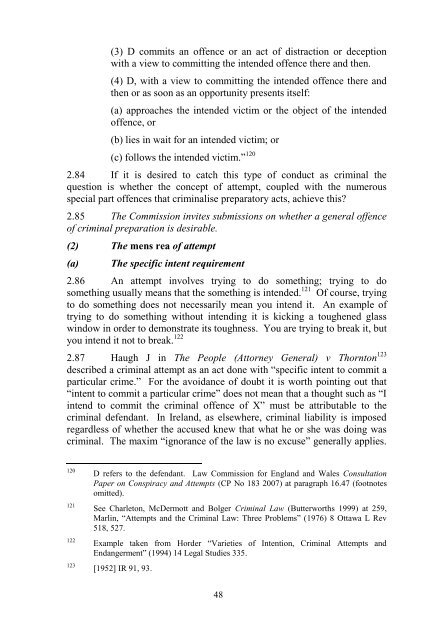Consultation Paper on Inchoate Offences - Law Reform Commission
Consultation Paper on Inchoate Offences - Law Reform Commission
Consultation Paper on Inchoate Offences - Law Reform Commission
You also want an ePaper? Increase the reach of your titles
YUMPU automatically turns print PDFs into web optimized ePapers that Google loves.
(3) D commits an offence or an act of distracti<strong>on</strong> or decepti<strong>on</strong>with a view to committing the intended offence there and then.(4) D, with a view to committing the intended offence there andthen or as so<strong>on</strong> as an opportunity presents itself:(a) approaches the intended victim or the object of the intendedoffence, or(b) lies in wait for an intended victim; or(c) follows the intended victim.” 1202.84 If it is desired to catch this type of c<strong>on</strong>duct as criminal thequesti<strong>on</strong> is whether the c<strong>on</strong>cept of attempt, coupled with the numerousspecial part offences that criminalise preparatory acts, achieve this?2.85 The Commissi<strong>on</strong> invites submissi<strong>on</strong>s <strong>on</strong> whether a general offenceof criminal preparati<strong>on</strong> is desirable.(2) The mens rea of attempt(a)The specific intent requirement2.86 An attempt involves trying to do something; trying to dosomething usually means that the something is intended. 121 Of course, tryingto do something does not necessarily mean you intend it. An example oftrying to do something without intending it is kicking a toughened glasswindow in order to dem<strong>on</strong>strate its toughness. You are trying to break it, butyou intend it not to break. 1222.87 Haugh J in The People (Attorney General) v Thornt<strong>on</strong> 123described a criminal attempt as an act d<strong>on</strong>e with “specific intent to commit aparticular crime.” For the avoidance of doubt it is worth pointing out that“intent to commit a particular crime” does not mean that a thought such as “Iintend to commit the criminal offence of X” must be attributable to thecriminal defendant. In Ireland, as elsewhere, criminal liability is imposedregardless of whether the accused knew that what he or she was doing wascriminal. The maxim “ignorance of the law is no excuse” generally applies.120121122123D refers to the defendant. <strong>Law</strong> Commissi<strong>on</strong> for England and Wales <str<strong>on</strong>g>C<strong>on</strong>sultati<strong>on</strong></str<strong>on</strong>g><str<strong>on</strong>g>Paper</str<strong>on</strong>g> <strong>on</strong> C<strong>on</strong>spiracy and Attempts (CP No 183 2007) at paragraph 16.47 (footnotesomitted).See Charlet<strong>on</strong>, McDermott and Bolger Criminal <strong>Law</strong> (Butterworths 1999) at 259,Marlin, “Attempts and the Criminal <strong>Law</strong>: Three Problems” (1976) 8 Ottawa L Rev518, 527.Example taken from Horder “Varieties of Intenti<strong>on</strong>, Criminal Attempts andEndangerment” (1994) 14 Legal Studies 335.[1952] IR 91, 93.48
















